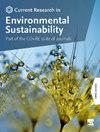融合与剥夺:权力动力学在跨学科研究中的作用
IF 3.8
Q2 ENVIRONMENTAL SCIENCES
Current Research in Environmental Sustainability
Pub Date : 2025-01-01
DOI:10.1016/j.crsust.2025.100300
引用次数: 0
摘要
本文的目的是解决跨学科项目通过更包容的知识共同创造形式来克服不平等的愿望与跨学科合作者之间的权力动态再现这些不平等的风险之间的紧张关系。我们研究了与种族、阶级、性别、民族、农村和地理等相关的不同层次是如何构成这些合作者的位置的。受Nego Bispo的“融合”概念的启发,强调不同知识系统的共存而不失去其独特的身份,本文提出了一种反映跨学科中普遍存在的不平等而不放弃共同创造目标的方法。基于对巴西巴伊亚州北部海岸的一个手工渔村Siribinha的案例研究,我们研究了权力动态如何影响社区成员、当地决策者和研究人员之间的互动。在过去的九年里,我们的研究团队在与这个社区的合作工作中采用了参与式观察、半结构化访谈、设计研究方法和基于艺术的方法。调查结果表明,植根于历史边缘化的权力不平衡影响着谁参与决策过程以及谁的声音能被听到。社区被剥夺公民权的感觉与外部行为者在当地决策中的主导地位有关。基于这些发现,本研究呼吁人们理解,知识的融合可以在跨学科的努力中蓬勃发展,尽管它们内在地嵌入在不可避免的权力动力学中。本文章由计算机程序翻译,如有差异,请以英文原文为准。
Between confluence and disenfranchisement: The role of power dynamics in transdisciplinary research
The aim of this article is to address the tension between aspirations of transdisciplinary projects to overcome inequalities through more inclusive forms of knowledge co-creation and risks of reproducing these inequalities through power dynamics among transdisciplinary collaborators. We examine how different layers - related to race, class, gender, ethnicity, rurality, and geography, among others - structure the positions of such collaborators. Inspired by Nego Bispo's concept of "confluence," which emphasizes the coexistence of diverse knowledge systems without losing their unique identities, this article proposes an approach that is reflective of prevailing inequalities in transdisciplinarity without giving up on the goal of co-creation. Based on a case study in Siribinha, an artisanal fishing village on the northern coast of Bahia, Brazil, we examine how power dynamics shape the interactions between community members, local policy makers, and researchers. Over the past nine years, our research team has employed participant observation, semi-structured interviews, design research methods, and arts-based methods in collaborative work in and with this community. The findings reveal that power imbalances, rooted in historical marginalization, influence who participates in decision-making processes and whose voices are heard. The community's sense of disenfranchisement is linked to the dominance of external actors in local decision making. Based on these findings, this study calls for an understanding that confluences of knowledge can flourish in transdisciplinary efforts despite their inherent embedment in inevitable power dynamics.
求助全文
通过发布文献求助,成功后即可免费获取论文全文。
去求助
来源期刊

Current Research in Environmental Sustainability
Environmental Science-General Environmental Science
CiteScore
7.50
自引率
9.10%
发文量
76
审稿时长
95 days
 求助内容:
求助内容: 应助结果提醒方式:
应助结果提醒方式:


